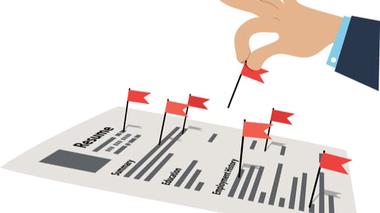What is a recruitment red flag?
A red flag is a warning sign. If there are a lot of red flags, it’s best to disqualify the candidate.

Attitude
A candidate’s attitude is the biggest factor affecting their suitability for the role.

Negative attitude
A poor attitude is a bright red flag. The interview is the time to impress you. If they’re bored and uninterested in an interview, what sort of employee are they?

Desperation
Enthusiasm is great in any role, but desperation isn’t. When candidates are desperate, they are looking for a job and having no luck. It begs the question, “Why didn’t anyone else hire him/her?”
Signs of desperation include:
- Saying yes to everything
- Agreeing to anything
- The general stench of desperation
Over-enthusiasm
This is when desperation is genuine. The candidate isn’t desperate to work in any job. They want to work in your company. They REALLY want to work for your company. There’s a line at which enthusiasm is creepy.
Examples include:
- Sending inmails to employees on LinkedIn, asking them to put in a word
- Showing up for an interview, with your logo on a t-shirt.
- Referencing the company’s strategy
- Telling you how to grow the company
- Mentioning things they shouldn’t know (the name of your spouse or dog)

Being late
People have at least a few days' notice before an interview. It’s plenty of time to search the address online and make a plan to get there. An unpunctual interview candidate is an unpunctual employee. Details such as time and other people’s schedules mean nothing to them. They’ll show up when they are ready. Lateness is worse when the person doesn’t give an apology or an explanation.

Bragging about the job-hunting process
For many candidates, the job hunt process is exciting. There are lots of interesting roles available. Each time a company contacts them, it flatters their ego. They’re wanted and in demand.
Beware candidates who choose to tell you how great it’s going. The number of companies interested in them. The compliments they got from recruiters.
These people are full of bravado and want to trick you into acting fast. Don’t fall for the spin or enter a bidding war to get a candidate because they told you to.

Checking phone, watch or clock, repeatedly
If the person sitting across from you keeps checking the time, they want to leave. They’re bored. They realised 30 minutes ago that the job isn’t for them and they are going through the motions, so they don’t appear rude. If they want to leave, let them.

Chewing gum or eating during the interview
Recruiters said that chewing gum or eating in an interview is more common than you’d think.
Workplaces these days are less formal than twenty years ago. CEOs walk around in t-shirts and jeans, drinking coffee. Trendy receptionists greet you with “Hey man, how’s it going?”.
Interviews are still formal, younger people sometimes don’t know the nuance. If they are chewing gum or eating food, take note. If they misbehave in an interview, they’ll misbehave at work.

Delayed communication
When you ask the candidate a question and they take a long pause before scrambling for a halfway decent answer, it’s a sign that they didn’t prepare for the interview.

Arrogant
- Did the candidate single-handedly complete all projects in their previous role, because their colleagues are idiots?
- Is the candidate snidely asking you about your professional background?
- Are they the greatest ever salesperson, engineer, administrator?
People who are braggy and cocky are hiding something; their lack of skills or insecurity.
Candidates who claim everything they do is fantastic, and have no flaws, are lying. Save yourself the hassle of a nightmare employee.

Excuses, excuses, excuses
- People with excuses for everything are poor candidates. Missed a target? It was the wrong time of year.
- Couldn’t get a campaign working? They didn’t have the budget.
- Couldn’t code? They didn’t have the right equipment.
They have a problem for every solution. Everything is someone else’s fault and they can’t do anything about it.
If they have excuses and solutions, it’s far better.
For example:
“I missed my sales target twice in a row. I didn’t know what was going wrong. I asked a senior salesperson to listen to my calls. After an hour of coaching, I learned a lot and started hitting my targets”
Or
“We couldn’t hire the number of people we wanted to. I was spending too much time on tedious admin. We found an ATS that enabled us to achieve the company’s staffing goals.”
The lack of self-awareness in their weaknesses makes them uncoachable. Instead of realising a problem and solving it, they sit there and blame everyone else.

Getting defensive instead of saying they don’t know
During the interview process, you’ll ask candidates something they don’t know. Good candidates say they don’t know.
Poor candidates get defensive or give jargon answers that don’t answer the question. They think you don’t notice that they’re waffling!
If a candidate gets defensive instead of saying they don’t know, it’s a red flag. If they become an employee, it will be hard for the line manager to train them. Unless they’re Sherlock Holmes, they won’t be able to assess their skills and weaknesses. The better candidate, in this case, is the one who says “I don’t know.”

Rote answers
There are hundreds of guides, videos, and books on answering interview questions. Beware the candidate who memorised all of them! It signals a lack of authenticity. What are they hiding?
The interview is a chance to get to know the person you’ll be working with for a few years. If they are fake in an interview, how will you get to know them? Do you want to work with a robot, devoid of personality?

Lack of career goals
Candidates without goals meander through life, taking any opportunity that comes their way. They are directionless.
This is a red flag for many roles. If they don’t care about their careers, they won’t care about the job or company.

Overly emotional
Interviews are professional and balanced. When someone gets overly annoyed, upset, angry, or displays any extreme emotion, it should be noted. If they can’t keep their composure in an interview, imagine what they’d be like in meetings or at their desk.

Rudeness
Any instance of rudeness in a candidate will be magnified as an employee. Interviewees are polite to hiring managers and HR people.
- How do they treat the receptionist on the way in and out?
- If they interact with people on the way to the interview room, are they professional?
Why not get your team involved? Ask the receptionist to have a chat while they’re waiting. Some recruiters invite final candidates to lunch. It helps them relax and be themselves. You’ll find out who they really are by how they treat restaurant staff.

Lack of self-awareness
Self-awareness is a key attribute in business. We all need to know how we come across, how our actions affect others, how our contributions affect outcomes, and where our strengths and weaknesses are.
To gauge a candidate's level of self-awareness, ask them about a project that went badly. If they say they can’t think of one, they’re lying.
If they explain projects that went badly because of everyone else's incompetencies, the candidate lacks self-awareness.
Self-aware people explain the key points in their careers, how their contribution affected different projects. And explain how they realised and overcame their own shortcomings. If a candidate cannot self-reflect, working with them will be challenging.

Inability to take feedback
Everyone you meet is a work-in-progress. No-one is perfect. We all have areas we could improve. If you ask the interviewee a probing question and they get defensive, or if they say their manager never gave them feedback, it signals a lack of development or desire to improve.

Lack of interest
If the candidate isn’t very interested in the role, it’s a waste of time. Ask questions like “Why do you want to work here?” to gauge their true motivations.

Asking too many questions
Some candidates try to turn the tables by interviewing you. They have questions about the workplace, company, culture, product, and opinions about everything.
By the end, you feel exhausted, interrogated and hope you haven’t given too much information away. You look at your scoresheet and realise that the candidate spent so much time asking questions; they didn’t show any skills or attributes that would make them a suitable candidate for the next round. Asking questions is good. Dominating the interview is terrible.

Wants a lot of accommodations
So you organised an interview for a suitable candidate, and agreed on a time. They ask for travel expenses.
They get to interview; you offer them tea or coffee. They ask for a vanilla latte, with soy milk and chocolate shavings on the side.
They tell you they need a window seat at work and need to get off early on Wednesdays to play badminton. They need to start late on Thursdays and like to take four weeks’ holidays during the summer and another four at Christmas.
While writing their PFO, be grateful that they showed you exactly who they are during the interview process.

Complaining
Complaining about anything in an interview suggests a poor attitude or communications skills.

Complaining about their previous employer
Candidates who complain about their previous employer will complain about you if they become an employee.
The exception to this is if they speak highly of previous employers except for their current one. If they only had an issue with one, perhaps it was a personality or culture clash.
Check Glassdoor to see if other people echo the candidate’s sentiments. They might be genuinely in an unpleasant situation.

Colleagues
When candidates speak badly of their entire team, it reflects on them too.

Previous jobs
- Is the candidate leaving because they don’t think their current job is good enough?
- Do they speak badly of their career’s journey?
If the candidate disparages their entire career, the candidate is a red flag!
- Can they not get the jobs they want?
- Did they upskill to get something that suited them better?
- Did they want the job but find something to dislike in every place they went to?
If they were unhappy in every role they had, they won’t like the role you’re hiring for either.

Motivations
Money motivates everyone. Even if you really like your job, you wouldn’t do it for free. When people are only motivated by money it’s a red flag.
(Unless the role is a sales role, then hiring someone who is greedy, and driven by money is a plus.)

If you get through the phone screen and one round of interviews, without a single question from them, it’s a red flag. Either they don’t want the job after all, or they’ll accept anything.

If the candidate asks lots of questions about salary, promotions, sick pay, benefits, it’s a red flag. They are only interested in what they’ll get out of you, not what they’ll be putting in. They are already planning their next move and planning how much time they can take off.
Conclusion
This is our complete list of recruitment red flags related to attitude. Sign up for updates to get more articles like this one.
Set up a free demo with HireHive today!


































